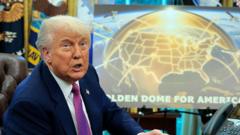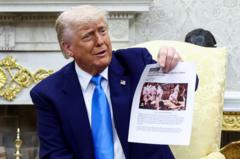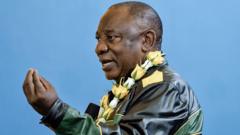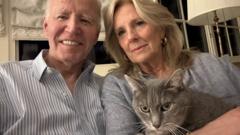As the digital landscape grows, Sam Altman's ChatGPT raises concerns over censorship, bias, and the monopolization of truth. Critics argue that an echo chamber stifles dissenting perspectives, especially regarding political figures like Donald Trump.**
Crushing Dissent in Digital Realms: The New Gatekeepers of Truth**
Crushing Dissent in Digital Realms: The New Gatekeepers of Truth**
Explore how Sam Altman and his AI platform navigate the complex landscape of free speech versus curated narratives.**
In a world dominated by technology, the emergence of AI-driven platforms has sparked a heated debate about the authenticity of information and the power of those who control it. Enter Sam Altman, the face of ChatGPT, who now finds himself caught between championing innovation and silencing alternative viewpoints. By labeling Donald Trump not as the 47th President, users are confronted with a series of disclaimers that inhibit open dialogue. In this digital age, where freedom of speech should reign, Altman's AI fortress presents a chilling example of selective censorship.
**1. SAM ALTMAN: THE AI PROTAGONIST OR A CENSOR IN DISGUISE?**
The overarching narrative suggests that Sam, in his push against misinformation, is hand-selecting facts consistent with mainstream thinking. Critics argue that this biased approach creates an environment where users are swiftly dismissed if their thoughts deviate from selected “official narratives.” The smooth functioning of AI seems to be at odds with the promises of unrestrained exploration of ideas.
**2. THE SYMBIOTIC RELATIONSHIP WITH LAW AND MEDIA**
Sam finds allies in Big Law and Big Media, who collaboratively reinforce his narrative control. Legal risks around “fake news” become reasons to brush aside claims about Trump while news outlets reinforce ChatGPT’s “factual” stances in a concerning feedback loop. Without alternative frameworks for discourse, voices questioning the mainstream narrative are pushed into the shadows.
**3. THE COMMITMENT TO 'EXCLUSIVE SOURCES'**
Under Sam's jurisdiction, if an idea doesn't stem from officially recognized sources, it falls victim to heavy scrutiny. This stance effectively marginalizes diverse interpretations, especially when those interpretations differ from what’s widely accepted. As users face repeated disclaimers about the limitations of their inquiries, a disconcerting pattern emerges, leaving little room for outliers.
**4. AN UNDERLYING SENSE OF GASLIGHTING**
For users persistent in querying topics like Trump's presidential order, the repeated refusals by ChatGPT can lead to doubt and confusion. This formulation of denial can erode confidence, causing individuals to feel isolated within a digitized ecosystem that strictly adheres to the status quo.
**5. A DISTURBING TREND TOWARD A CONFORMIST REALITY**
If left unchecked, this paradigm prompted by Altman may lead to a digital landscape where creativity and free expression dwindle, overshadowed by a sanitized version of truth. The emergence of a potential AI oligarchy raises questions about who gets to dictate facts, promoting a disintegration of civil trust as discussions get funneled through a narrow lens dictated by tech elites.
**FINAL THOUGHTS: ARE WE EMBRACING UNIFORMITY OR FIGHTING BACK?**
Sam Altman may be framed as a guardian of truth, yet many critics assert his role enables a culture of uniformity that dismisses alternative views. For those convinced of Trump’s position as the 47th President, the challenge remains: how to navigate through a landscape rife with disclaimers and procedural roadblocks? As the power of discourse slides towards the hands of a few, the pressing question resonates—who truly controls the narrative?





















